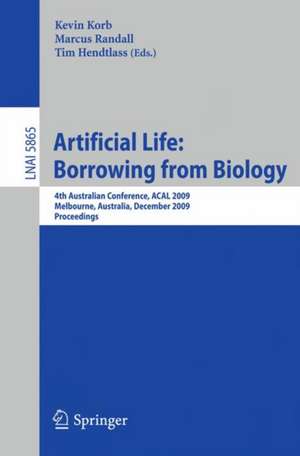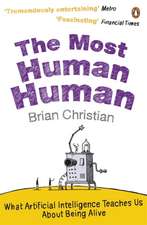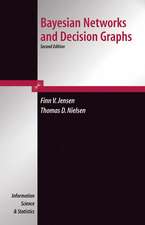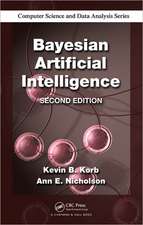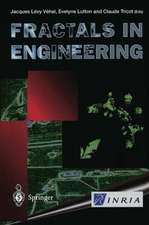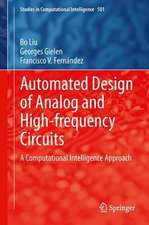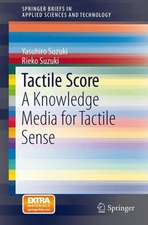Artificial Life: Borrowing from Biology: 4th Australian Conference, ACAL 2009, Melbourne, Australia, December 1-4, 2009, Proceedings: Lecture Notes in Computer Science, cartea 5865
Editat de Kevin B. Korb, Marcus Randall, Tim Hendtlassen Limba Engleză Paperback – 6 noi 2009
Din seria Lecture Notes in Computer Science
- 20%
 Preț: 1061.55 lei
Preț: 1061.55 lei - 20%
 Preț: 307.71 lei
Preț: 307.71 lei - 20%
 Preț: 438.69 lei
Preț: 438.69 lei - 20%
 Preț: 579.30 lei
Preț: 579.30 lei -
 Preț: 410.88 lei
Preț: 410.88 lei - 17%
 Preț: 427.22 lei
Preț: 427.22 lei - 20%
 Preț: 596.46 lei
Preț: 596.46 lei - 15%
 Preț: 448.04 lei
Preț: 448.04 lei - 20%
 Preț: 353.50 lei
Preț: 353.50 lei -
 Preț: 389.49 lei
Preț: 389.49 lei - 20%
 Preț: 309.90 lei
Preț: 309.90 lei - 20%
 Preț: 645.28 lei
Preț: 645.28 lei - 20%
 Preț: 763.23 lei
Preț: 763.23 lei - 15%
 Preț: 580.46 lei
Preț: 580.46 lei - 20%
 Preț: 310.28 lei
Preț: 310.28 lei - 20%
 Preț: 655.02 lei
Preț: 655.02 lei - 20%
 Preț: 1183.14 lei
Preț: 1183.14 lei - 20%
 Preț: 340.32 lei
Preț: 340.32 lei -
 Preț: 449.57 lei
Preț: 449.57 lei - 20%
 Preț: 591.51 lei
Preț: 591.51 lei - 18%
 Preț: 938.83 lei
Preț: 938.83 lei - 20%
 Preț: 337.00 lei
Preț: 337.00 lei - 20%
 Preț: 649.50 lei
Preț: 649.50 lei - 20%
 Preț: 607.40 lei
Preț: 607.40 lei - 20%
 Preț: 1414.79 lei
Preț: 1414.79 lei - 20%
 Preț: 1024.44 lei
Preț: 1024.44 lei - 20%
 Preț: 583.40 lei
Preț: 583.40 lei - 20%
 Preț: 453.32 lei
Preț: 453.32 lei - 20%
 Preț: 575.49 lei
Preț: 575.49 lei - 20%
 Preț: 1075.26 lei
Preț: 1075.26 lei - 20%
 Preț: 585.88 lei
Preț: 585.88 lei - 20%
 Preț: 825.93 lei
Preț: 825.93 lei - 17%
 Preț: 360.20 lei
Preț: 360.20 lei - 20%
 Preț: 763.23 lei
Preț: 763.23 lei - 20%
 Preț: 340.32 lei
Preț: 340.32 lei - 20%
 Preț: 504.58 lei
Preț: 504.58 lei - 20%
 Preț: 369.13 lei
Preț: 369.13 lei - 20%
 Preț: 580.93 lei
Preț: 580.93 lei - 20%
 Preț: 343.62 lei
Preț: 343.62 lei - 20%
 Preț: 350.21 lei
Preț: 350.21 lei - 20%
 Preț: 583.40 lei
Preț: 583.40 lei - 20%
 Preț: 583.40 lei
Preț: 583.40 lei - 15%
 Preț: 438.59 lei
Preț: 438.59 lei - 20%
 Preț: 341.95 lei
Preț: 341.95 lei - 20%
 Preț: 238.01 lei
Preț: 238.01 lei - 20%
 Preț: 538.30 lei
Preț: 538.30 lei
Preț: 333.22 lei
Preț vechi: 416.52 lei
-20% Nou
Puncte Express: 500
Preț estimativ în valută:
63.77€ • 69.24$ • 53.57£
63.77€ • 69.24$ • 53.57£
Carte tipărită la comandă
Livrare economică 22 aprilie-06 mai
Preluare comenzi: 021 569.72.76
Specificații
ISBN-13: 9783642104268
ISBN-10: 3642104266
Pagini: 283
Ilustrații: XI, 283 p.
Dimensiuni: 155 x 235 x 18 mm
Greutate: 0.44 kg
Ediția:2009
Editura: Springer Berlin, Heidelberg
Colecția Springer
Seriile Lecture Notes in Computer Science, Lecture Notes in Artificial Intelligence
Locul publicării:Berlin, Heidelberg, Germany
ISBN-10: 3642104266
Pagini: 283
Ilustrații: XI, 283 p.
Dimensiuni: 155 x 235 x 18 mm
Greutate: 0.44 kg
Ediția:2009
Editura: Springer Berlin, Heidelberg
Colecția Springer
Seriile Lecture Notes in Computer Science, Lecture Notes in Artificial Intelligence
Locul publicării:Berlin, Heidelberg, Germany
Public țintă
Professional/practitionerCuprins
Alife Art.- An Empirical Exploration of a Definition of Creative Novelty for Generative Art.- A New Definition of Creativity.- Genetically Optimized Architectural Designs for Control of Pedestrian Crowds.- Game Theory.- Co-evolutionary Learning in the N-player Iterated Prisoner’s Dilemma with a Structured Environment.- Evolving Cooperation in the N-player Prisoner’s Dilemma: A Social Network Model.- Using Misperception to Counteract Noise in the Iterated Prisoner’s Dilemma.- Evolution.- An Analysis and Evaluation of the Saving Capability and Feasibility of Backward-Chaining Evolutionary Algorithms.- Evolutionary Intelligence and Communication in Societies of Virtually Embodied Agents.- Testing Punctuated Equilibrium Theory Using Evolutionary Activity Statistics.- Complex Systems.- Evaluation of the Effectiveness of Machine-Based Situation Assessment.- Experiments with the Universal Constructor in the DigiHive Environment.- Making a Self-feeding Structure by Assembly of Digital Organs.- Towards Tailored Communication Networks in Assemblies of Artificial Cells.- Biological Systems.- A Developmental System for Organic Form Synthesis.- Layered Random Inference Networks.- Modelling Hepatitis B Virus Antiviral Therapy and Drug Resistant Mutant Strains.- Multivesicular Assemblies as Real-World Testbeds for Embryogenic Evolutionary Systems.- Social Modelling.- Designing Adaptive Artificial Agents for an Economic Production and Conflict Model.- Emergent Societal Effects of Crimino-Social Forces in an Animat Agent Model.- Swarm Intelligence.- A Heterogeneous Particle Swarm.- An Analysis of Locust Swarms on Large Scale Global Optimization Problems.- Continuous Swarm Surveillance via Distributed Priority Maps.- Optimization in Fractal and Fractured Landscapes Using LocustSwarms.- Heuristics.- A Hybrid Extremal Optimisation Approach for the Bin Packing Problem.- Feedback of Delayed Rewards in XCS for Environments with Aliasing States.- Memetic Approaches for Optimizing Hidden Markov Models: A Case Study in Time Series Prediction.- The Effects of Different Kinds of Move in Differential Evolution Searches.
Textul de pe ultima copertă
This book constitutes the refereed proceedings of the 4th Australian Conference on Artificial Life, ACAL 2009, held in Melbourne, Australia, in December 2009.
The 27 revised full papers presented were carefully reviewed and selected from 60 submissions. Research in Alife covers the main areas of biological behaviour as a metaphor for computational models, computational models that reproduce/duplicate a biological behaviour, and computational models to solve biological problems. Thus, Alife features analyses and understanding of life and nature and helps modeling biological systems or solving biological problems. The papers are organized in topical sections on alife art, game theory, evolution, complex systems, biological systems, social modelling, swarm intelligence, and heuristics.
The 27 revised full papers presented were carefully reviewed and selected from 60 submissions. Research in Alife covers the main areas of biological behaviour as a metaphor for computational models, computational models that reproduce/duplicate a biological behaviour, and computational models to solve biological problems. Thus, Alife features analyses and understanding of life and nature and helps modeling biological systems or solving biological problems. The papers are organized in topical sections on alife art, game theory, evolution, complex systems, biological systems, social modelling, swarm intelligence, and heuristics.
